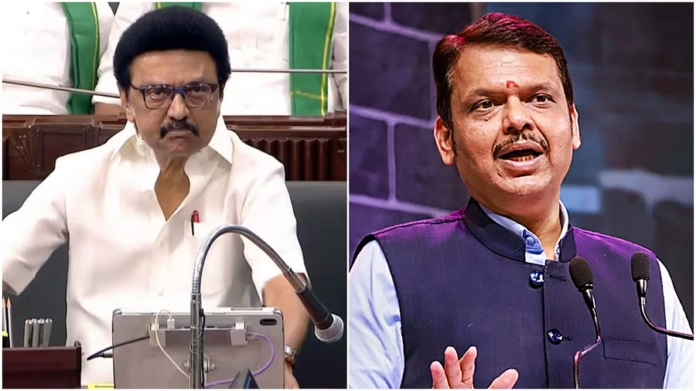States Disagree on Language Policy in Schools
A debate has broken out between Maharashtra and Tamil Nadu over how to implement the New Education Policy (NEP) 2020, especially regarding the use of languages in schools.
Maharashtra Chief Minister Devendra Fadnavis recently announced that Hindi will not be a required third language for students in Classes 1 to 5. He said that Marathi is the only language that will be mandatory. Other languages will be optional based on student choice.
Stalin Questions Centre Over Hindi Imposition
Tamil Nadu Chief Minister M K Stalin raised concerns about this announcement. He questioned whether the Union Government officially supports Maharashtra’s decision. He asked if other states can also make only one language mandatory without penalty.
Stalin also said the Centre had previously denied Tamil Nadu ₹2,152 crore in education funds for not following the three-language rule. He wants the Centre to confirm that NEP does not require a third compulsory language.
Fadnavis Defends Maharashtra’s Policy
Fadnavis replied to Stalin through a social media post. He said Stalin should study the NEP before raising questions. According to Fadnavis, the NEP only encourages students to learn two Indian languages besides English. It does not force any specific language.
He added that Maharashtra allows students to choose any third language, including Tamil, Telugu, Kannada, or Sanskrit. He asked why Tamil Nadu opposes giving students the option to learn Hindi if they want to.
Tamil Nadu Sticks to Its Two-Language Policy
Tamil Nadu has long opposed the three-language policy. The state follows a two-language system—Tamil and English—and views Hindi imposition as a threat to regional identity.
The state believes making Hindi compulsory would put its students at a disadvantage. It also says this move could increase the burden on teachers and schools.
Central Policy, Local Tensions
This language dispute reflects broader concerns about the NEP. While the policy promotes multilingual learning, states like Tamil Nadu worry it may indirectly force them to include Hindi.
Maharashtra’s decision to make the third language optional may seem flexible. But the debate shows that language in education remains a sensitive and political issue in India.
What Happens Next?
It is unclear whether the Centre will officially respond to Stalin’s questions. But the public disagreement has brought fresh attention to how the NEP is being applied across different states.
As the policy continues to roll out, the Centre may need to clarify its stance. Otherwise, more states may push back against what they see as a one-size-fits-all language rule.











